
Run, do not walk, to the La Mirada Theatre For The Performing Arts, where McCoy Rigby Entertainment is treating theater lovers to an absolutely brilliantly directed, acted, and designed production of David Lindsay-Abaire’s Pulitzer Prize-winning Rabbit Hole.
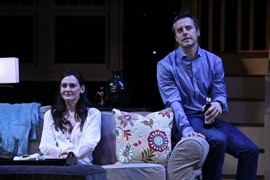 Spoilers abound in this review, so if you don’t know Rabbit Hole and wish to be thoroughly surprised, read no further, except to know that with six-time Scenie-winning Director Of The Year Michael Matthews waving his magic wand, Deborah Puette and Michael Polak giving definitive performances as Becca and Howie, a trio of supporting performance gems, and a dream team of designers behind the scenes, you simply could not be in more expert hands.
Spoilers abound in this review, so if you don’t know Rabbit Hole and wish to be thoroughly surprised, read no further, except to know that with six-time Scenie-winning Director Of The Year Michael Matthews waving his magic wand, Deborah Puette and Michael Polak giving definitive performances as Becca and Howie, a trio of supporting performance gems, and a dream team of designers behind the scenes, you simply could not be in more expert hands.
As for those who already know Lindsay-Abaire’s play or have seen its screen adaption, the rest of this review is for you.
David Lindsay-Abaire’s Rabbit Hole is about grief, and the different ways that people deal with it. More specifically, it’s about what is arguably the most wrenching grief any human being can face, the loss of a child.
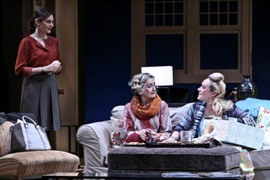 What makes Lindsay-Abaire’s play a Pulitzer Prize winner and not a Lifetime Movie For Women is its unpredictable, unsentimental, un-clichéd, script, and the humor which Lindsay-Abaire finds even in the heart of tragedy.
What makes Lindsay-Abaire’s play a Pulitzer Prize winner and not a Lifetime Movie For Women is its unpredictable, unsentimental, un-clichéd, script, and the humor which Lindsay-Abaire finds even in the heart of tragedy.
The play’s opening scene is deceptively benign. Becca, a 30something wife and mother, is folding the laundry, clothes which appear to be those of a four-year-old, and chatting with her spirited sister Izzy (Kristina Johnson). Baby Sis has gotten herself into a barroom brawl, and in its telling, she lets slip that she’s pregnant. Little by little, it dawns on us that the clothes Becca is folding belong to a child who is no more, a little boy named Danny who not so long ago chased the family dog out into the street and was struck by a car and killed. What makes Danny’s death even more senseless is that the car was not speeding; its teenage driver could have done nothing to avoid hitting the boy, who must simply have materialized between parked cars. It just happened, in an instant, and no one’s life will ever be the same.
Becca’s husband Howie deals with his grief by attending group therapy sessions and by watching endless videos of his son’s brief life. Becca copes, or attempts to cope, by making sure that nothing in her home reminds her of Danny. She has removed all pictures of him from the living room, is donating his clothes to charity, and has placed his beloved dog in the care of her mother Nat (Lori Larsen). Becca’s husband clings to the familiar; Becca just wants to sell the house and move away.
It’s not merely Izzy’s pregnancy that prevents Becca from moving on. She has received a letter from the teenage driver Jason (Seamus Mulcahy), who has written a short story which he wants to dedicate to Danny, and has asked if it would be possible to meet Becca and Howie.
No way, says Howie. Becca is not so sure, and goes so far as to read Jason’s story, a tale of alternate universes which sets Becca’s mind to wondering, is there an alternate Becca whose life is happy, and could she possibly go down the rabbit hole and become that alternate version of herself?
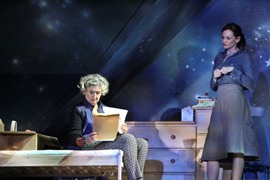 Those whose only exposure to Rabbit Hole has been John Cameron Mitchell’s superb film adaptation, for which Lindsay-Abaire himself wrote the remarkable screenplay, will be particularly fascinated to discover how the film’s multi-location, bigger cast-of-characters storyline developed from a single-set, five-character play, with both play and film telling the story equally well, albeit quite differently.
Those whose only exposure to Rabbit Hole has been John Cameron Mitchell’s superb film adaptation, for which Lindsay-Abaire himself wrote the remarkable screenplay, will be particularly fascinated to discover how the film’s multi-location, bigger cast-of-characters storyline developed from a single-set, five-character play, with both play and film telling the story equally well, albeit quite differently.
Anyone who’s followed L.A. theater over the past eight years knows that there is no more gifted director on our stage scene than Michael Matthews, particularly in productions in which an audience’s imagination plays a large part, shows like the much lauded Peter Pan: The Boy Who Hated Mothers, Very Still And Hard To See, and The Temperamentals.
Rabbit Hole now demonstrates Matthews’ genius at putting brilliant original touches on a single-set play, personal touches that go above and beyond inspiring superb performances from each and every cast member.
Listen to how Matthews and sound designer Josh Bessom have combined talents to link scenes with drama-enhancing musical underscoring and an ominous rumbling that reaches its climax in Act One’s absolutely devastating final seconds, staged with an impact I cannot recall in any of the five previous Rabbit Holes I’ve seen.
Watch how Matthews and scenic designer Stephen Gifford work together to give us a house that is considerably more than it seems at first glance, one whose invisible walls allow us to see characters even before they arrive at Becca and Howie’s door, making for some great “I wonder what’s going to happen next” moments. Pay attention to the direction Jason looks following his second visit and you’ll see a moment not in Lindsay-Abaire’s script that will take your breath away.
Notice the collaboration between Matthews and lighting designer extraordinaire Tim Swiss, whose inspired choice of colors reflect the changing atmosphere inside Becca and Howie’s home. (The starry night sky in the play’s final scene is simply exquisite.) Ann-Closs Farley’s character-perfect costumes and Terry Hanrahan’s pitch-perfect properties design are further examples of director-designer teamings at their most synergistic.
As for the company of actors Matthews has assembled, it would not be going too far to call them a dream cast.
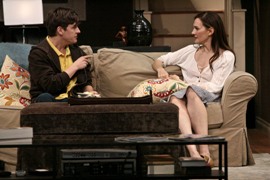 I have been wanting to see StageSceneLA’s 2010-2011 Actress Of The Year Scenie winner play Becca since a community theater production a couple years back had me wondering, “What would Deborah Puette give to Becca that was lacking in the performance I just saw?”
I have been wanting to see StageSceneLA’s 2010-2011 Actress Of The Year Scenie winner play Becca since a community theater production a couple years back had me wondering, “What would Deborah Puette give to Becca that was lacking in the performance I just saw?”
It should come as no surprise, then, that Puette is perfection in the role, her outward calm hiding a rising tide of repressed emotions ever on the point of spewing out, only to be quickly hidden once again as a means of self-preservation. The unexpected moments when Puette makes the choice to “lose it” took my breath away, but these moments are but part of a heartbreakingly touching, deeply felt, award-caliber performance. Critics and Ovation voters must see Deborah Puette’s work in Rabbit Hole. No ifs, ands, or buts about it.
The gods of theater were smiling on Matthews when he cast Polak as Howie, the previously unseen-in-L.A. actor matching his leading lady’s performance every step of the way. Polak reveals all of Howie’s pain, considerably closer to the surface than Becca’s. His rage in the “video scene” and in his frightening response to an unexpected visit are simply devastating, but Polak is just as remarkable in quieter moments. Good looks that would easily have snared Puette’s stunning Becca are icing on the cake.
I absolutely loved Johnson’s feisty but deep-hearted Izzy and Larsen’s rough-edged but wise Nat. As for New York-based, recent Yale School Of Drama MFA grad Mulcahy’s extraordinarily touching Jason, may I simply say “Welcome to L.A. and do stick around.”
Kudos as always to casting director Julia Flores, production stage manager Lisa Palmire, assistant stage manager Hanrahan, general manager Buck Mason, and technical director David Cruise.
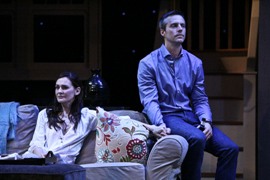 It’s taken six Rabbit Holes for this reviewer to finally see the production this Pulitzer Prize winner deserves. Make no mistake, a couple of previous incarnations were quite wonderful in their own right. Still, La Mirada/McCoy Rigby’s latest is the best of the bunch, and one I hope to see again before it closes. Make the drive to La Mirada and you’ll see exactly why.
It’s taken six Rabbit Holes for this reviewer to finally see the production this Pulitzer Prize winner deserves. Make no mistake, a couple of previous incarnations were quite wonderful in their own right. Still, La Mirada/McCoy Rigby’s latest is the best of the bunch, and one I hope to see again before it closes. Make the drive to La Mirada and you’ll see exactly why.
La Mirada Theatre for the Performing Arts, 14900 La Mirada Boulevard, La Mirada.
www.lamiradatheatre.com
–Steven Stanley
October 26, 2013
Photos: Michael Lamont
Tags: David Lindsay-Abaire, La Mirada Theatre, Los Angeles Theater Review, Rabbit Hole


 Since 2007, Steven Stanley's StageSceneLA.com has spotlighted the best in Southern California theater via reviews, interviews, and its annual StageSceneLA Scenies.
Since 2007, Steven Stanley's StageSceneLA.com has spotlighted the best in Southern California theater via reviews, interviews, and its annual StageSceneLA Scenies.







 COPYRIGHT 2024 STEVEN STANLEY :: DESIGN BY
COPYRIGHT 2024 STEVEN STANLEY :: DESIGN BY